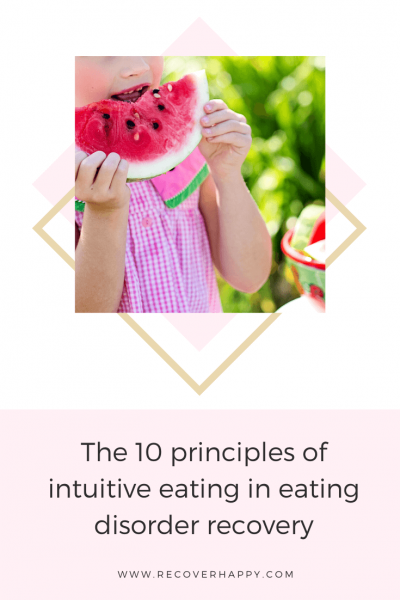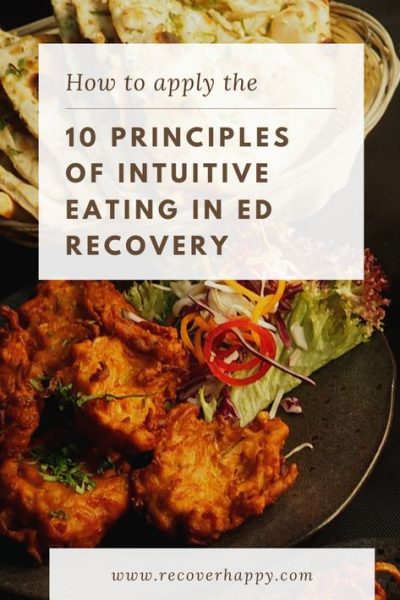The 10 principles of intuitive eating in eating disorder recovery

By Tanja _ November 25, 2019
When was the last time that you actively listened to your body? That you listened to your body’s needs? You might not know it any more. You might have forgotten the voice of your body. Because your eating disorder, with its rules and behavioural patterns, has cut you off from your body.
This also happened to me. I had strict rules and beliefs about eating and my choice of food. I struggled with feelings of guilt or regret when I broke one of my “rules”. And I berated myself for being weak and not following my “rules”. I labelled food as “good” and “bad”.
One crucial part of my recovery was to re-learn to listen to the signs of my body. I needed to reframe my thinking to understand again the hunger cues of my body and signs of being full and satisfied. Instead of rules and limitations, I learned to focus on listening to my body’s physical and emotional needs. This required me to be aware of my mental state, my relationship with food and my daily moods. This connection with my body and mind helped my natural functions to flourish. Intuitive eating helped me a lot to recover fully from anorexia. Expanding my food choices, moving away from labelling food as “good” and “bad” and trusting my mind- body connection to guide me have helped my healing significantly.
If you want to learn more about why you should apply intuitive eating in your recovery journey, read my blog article about the power of intuitive eating in eating disorder recovery.
Intuitive eating is not something that will happen overnight, it requires constant practice and adjustments, but it can certainly shift your mindset and your eating behaviour.
Let me share how you can implement the 10 intuitive eating principles in your eating disorder recovery to make your recovery a success.
Before we get started, please note that I will distinguish between anorexia on the one hand and bulimia, binge eating disorder and orthorexia on the other.
1. Reject the diet mentality
The first and most important step of becoming an intuitive eater is to let go of your diet thoughts and intentions. I know the thought of giving up your diet rules and beliefs is quite challenging and might scare you. But reflect on your eating disorder history and ask yourself: did my eating disorder give me the results that I was aiming for? How have my eating disorder and strict rules affected my life? Have they made me happier?
If you have anorexia: Read books and articles to get a better understanding of why restrictive rules are unhelpful and can be deadly.
If you have bulimia, binge eating disorder & orthorexia (which I will refer to collectively as “BBO”): Become aware that restrictive rules don’t work as they trigger hunger, which can cause binge eating.
2. Honour your hunger
Learn to recognise the hunger signals of your body and honour them. View them as a cue that your body needs to be fed. Every time you feed your body when you experience signals of hunger, you will build trust in your body, yourself and food.
Anorexia: Your body and brain need calories to function. Without calories, your mind can’t work and you can’t think properly. The focus of this principle is on weight restoration. Create a plan to establish a way of eating that feels safe for you.
BBO: Try to feed your body regularly (3 meals and 2-3 snacks a day). This will help you to experience gentle hunger rather than become overly hungry, which often comes with overeating and bingeing.
3. Make peace with food
Give yourself unconditional permission to eat and enjoy all foods. This is a crucial part of your recovery. Aim to remove gradually any rules or restrictions you have set for yourself as a result of your eating disorder. By making peace with food and allowing yourself all foods without judgement, you will find that eating becomes less stressful.
Anorexia: When you are ready, take risks and try to implement slowly new foods in your eating.
BBO: When you have reached the point where you aren’t experiencing stress or other negative feelings and you aren’t overly hungry, try some of your “fear” foods.
4. Challenge the food police
The food police are the thoughts and beliefs that tell you that you are “good” if you eat only vegetables for lunch and “bad” if you eat a cake or one of your “forbidden” foods. Learning to challenge the food police is a crucial part of your recovery and becoming an intuitive eater.
Anorexia or BBO: Identify your false beliefs about food and your body. Challenge and reframe these thoughts and beliefs and try to take the judgement and morality out of your eating.
5. Feel your fullness
Learn what comfortably full feels like. I know this might be quite challenging, especially if you are restoring your weight and your body constantly feels full because of slower digestion. So begin by pausing while eating less challenging snacks or meals, so that you can identify the changes in your fullness level. Recognising and respecting your fullness will help you to build trust in yourself and your body.
Anorexia: If you are the start of your recovery, you might not be able to rely on your fullness signals, as your body feels full after you have eaten small portions. Try to follow your meal plan and observe the changes in your fullness level.
BBO: You may feel temporarily bloated if you stop purging, which might distort your feeling of fullness. However, once you have started to eat regularly, you will start to recognise your fullness cues.
6. Discover the satisfaction factor
This principle is one of the key elements of becoming an intuitive eater. Learning to enjoy food without labelling it or feeling guilty will leave you feeling satisfied and content. At the start, try to increase your enjoyment by using “safer” food such as fruit. Once this becomes less scary, try sugary food such as cakes and yoghurts.
Anorexia: You might find it difficult to let yourself experience enjoyment from eating. Just keep going and try again and again.
BBO: You will experience less bingeing if you experience satisfying food regularly.
7. Honour your feelings without using food
Using food to deal with uncomfortable emotions does little to help you with the situation and only leaves you feeling worse. Learning to deal with your emotions without using food might be challenging at the start but is an important part of intuitive eating.
Anorexia: Your food rituals and obsessive thinking have helped you in the past to cope with negative feelings. However, becoming fully nourished will help prepare you to deal with such feelings.
BBO: You previously used binge eating, excessive exercise and purging as coping strategies for negative emotions. Now try to have a break from these strategies and start to explore, experience and deal with your feelings.
8. Respect your body
Learn to treat your body with respect and kindness, no matter what you think of it. This might be challenging for you, as you might see your body as your enemy. Try to accept that there is no correct body shape or size; the important issue is what “healthy” looks like.
Anorexia: Become more aware of the uniqueness and beauty of your body by healing your body image distortion.
BBO: Try to respect and honour your “here and now” body.
9. Exercise - Feel the difference
Doing sport just for the purpose of burning calories and losing weight is not a principle of intuitive eating. Try to shift your mindset to what types of movement feel good to you. How do you feel during and after a workout? Does it energise you? Instead of using sport as a punishment for what you have eaten, use sport as a way to feel good.
Anorexia: When you feel ready, you might start with gentle sport such as walking or yoga. This will help you to be more in tune with your body.
BBO: Try to do moderate exercise, which can help you deal better with stress and anxiety.
10. Honour your health with gentle nutrition
Becoming an intuitive eater is not about eating “perfectly”. Instead, choose food that is tasty and satisfying.
Anorexia or BBO: Honour your health by accepting that your body needs fat, carbohydrates, energy and a variety of foods.
You don’t need to struggle alone on your recovery journey. Simply get in touch to discuss how I can help you.
It is entirely possible to overcome an eating disorder – I have done it, others have done it and so can you!



